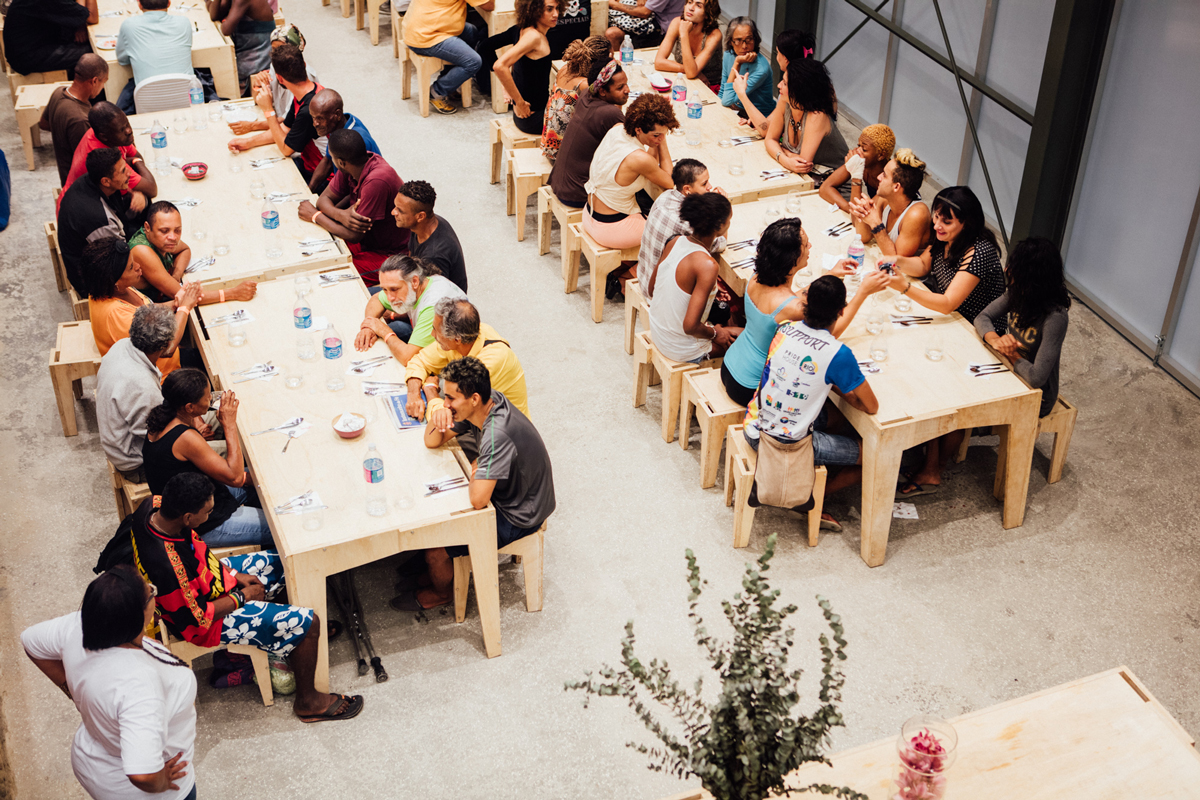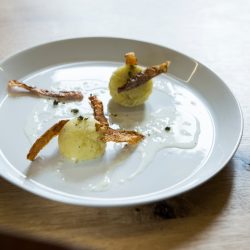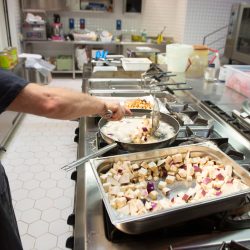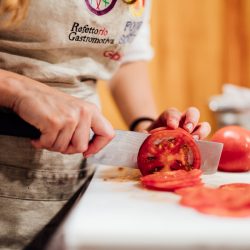THE 3-MICHELIN-STARS AND WORLD-RENOWNED ITALIAN CHEF HAS CREATED A MENU USING LEFTOVER INGREDIENTS FROM THE OLYMPIC VILLAGE’S KITCHEN, WHICH ARE THEN SERVED WITH RESPECT TO THE HOMELESS
The idea of redesigning and recycling ‘leftovers’ or ‘waste’ is nothing new. We have seen more than enough super chic, ecofriendly aesthetics being forced onto people of a lower-income level, for instance, in design competitions where designers redesign waste (with the intention of keeping the ‘recycled waste’ look) into a house or community center for low-incomers. But what the bourgeoisie seem to forget is that the working class do not live a simple life by choice or out of ideology. They live sufficiently because they have to. Deep down, we all share the same dream of living a comfortable, luxurious life (the kind that makes the world ‘warmer’). If they won the lottery, the first thing they’d do would be to replace the romantic thatch roofs of their homes with bright blue ceramic tiles and, in a heartbeat, say goodbye to poverty right then and there…What has been said earlier is not an exaggeration, at least until the ‘leftovers’ or ‘waste’ become (are made into) a luxurious object that we commoners can fully and proudly embrace into our daily lives.
If this were the case, the project, Refettorio Gastromotiva, a luxurious three-course meal for the underprivileged in Rio de Janeiro, Brazil, that has world-class chef Massimo Bottura behind its creation, is an intriguing example and definitely worthy of discussion. Basically, what Bottura does is not make leftovers out of leftovers (for the sake of a cliché eco-friendly aesthetic) or turn the ‘unwanted’ into something with only a moderate level of usability, but rather what has been achieved is the use of creativity and one’s abilities to change leftovers into a super special luxurious product that even the bourgeoisie crave (but cannot enjoy because they are not poor enough). For those who didn’t know, Bottura is a world-renowned Italian chef whose restaurant in Modena, Italy, Osteria Francescana, received three Michelin Stars and a number-one ranking on ‘The World’s 50 Best Restaurants of 2016’ list.
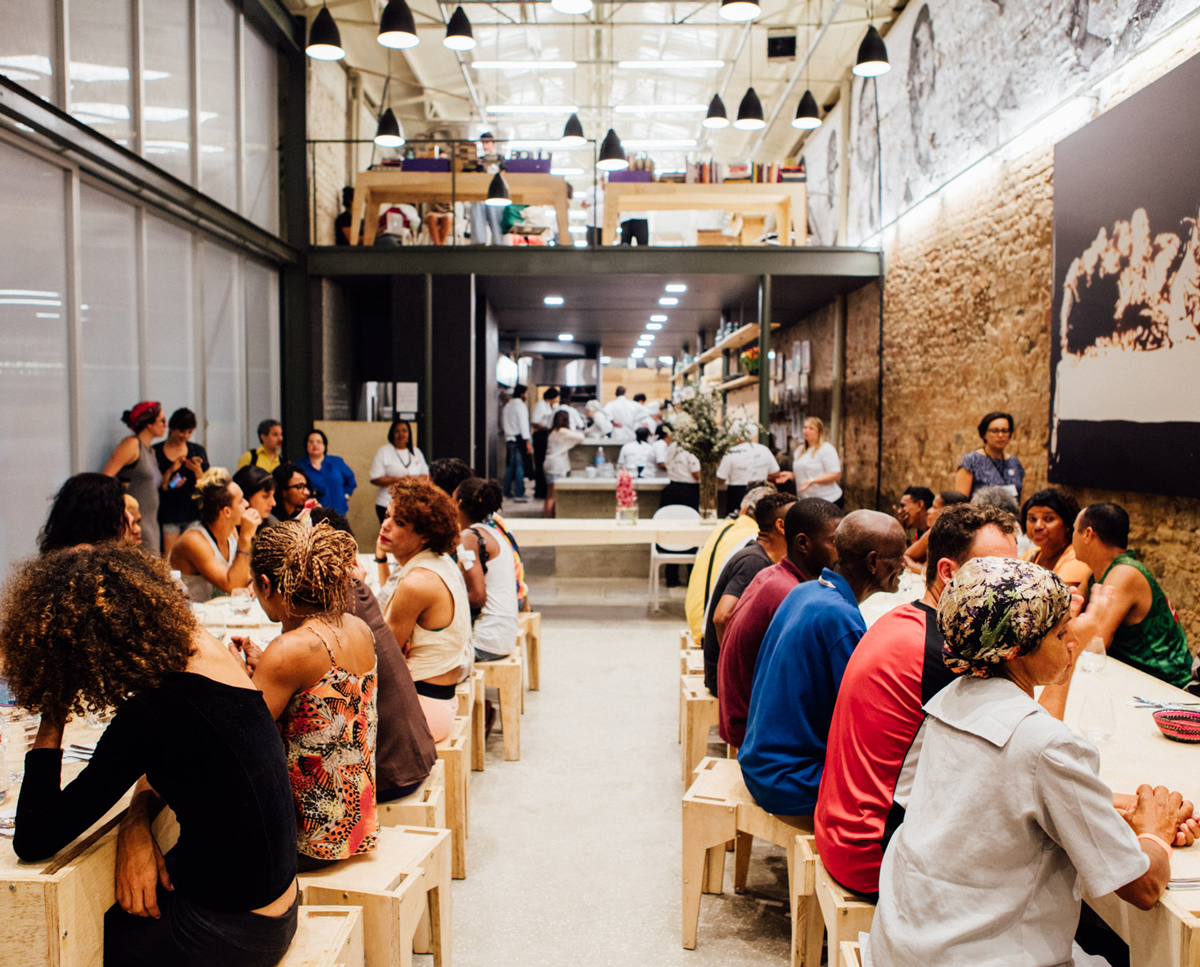
Born in 1962, Bottura’s interest in cooking came about early on when he was just a kid inspired by the home cooking of his mother, aunt and grandmother. In 1986, while studying law, a restaurant in the suburbs of Modena was up for sale. He took a leave from his studies, bought the property and renovated the space into his first and very own restaurant named Trattoria del Campazzo. In 1995, he went on to open Osteria Francescana in Modena’s city center with an aim to combine traditional recipes with contemporary design and art innovations. 2015 was the year when Expo Milano was held and Bottura, together with his network of world-class chef fellows, renovated an old theatre in a suburban Milan area into a restaurant, using over 15 tons of ingredients left over from cooking at their restaurants to prepare over 10,000 meals for refugees, homeless people and the poor.
Then came the 2016 Olympics in Rio de Janeiro which was held amidst controversy due to the massive amount of money spent on preparation for the event that many people of the city protested should have been used to help reconcile the country’s poverty and social inequalities. With the past year being Brazil’s worst in terms of economic recession, 16 almshouses in the city were forced to cease their operations or had their budgets cut and the coming of Bottura’s Refettorio Gastromotiva perfectly reinforced awareness of food waste and social inequalities. Bottura intends to use his reputation to help spread such ideology, question and raise funds, all the while causing the message to be more widely heard.
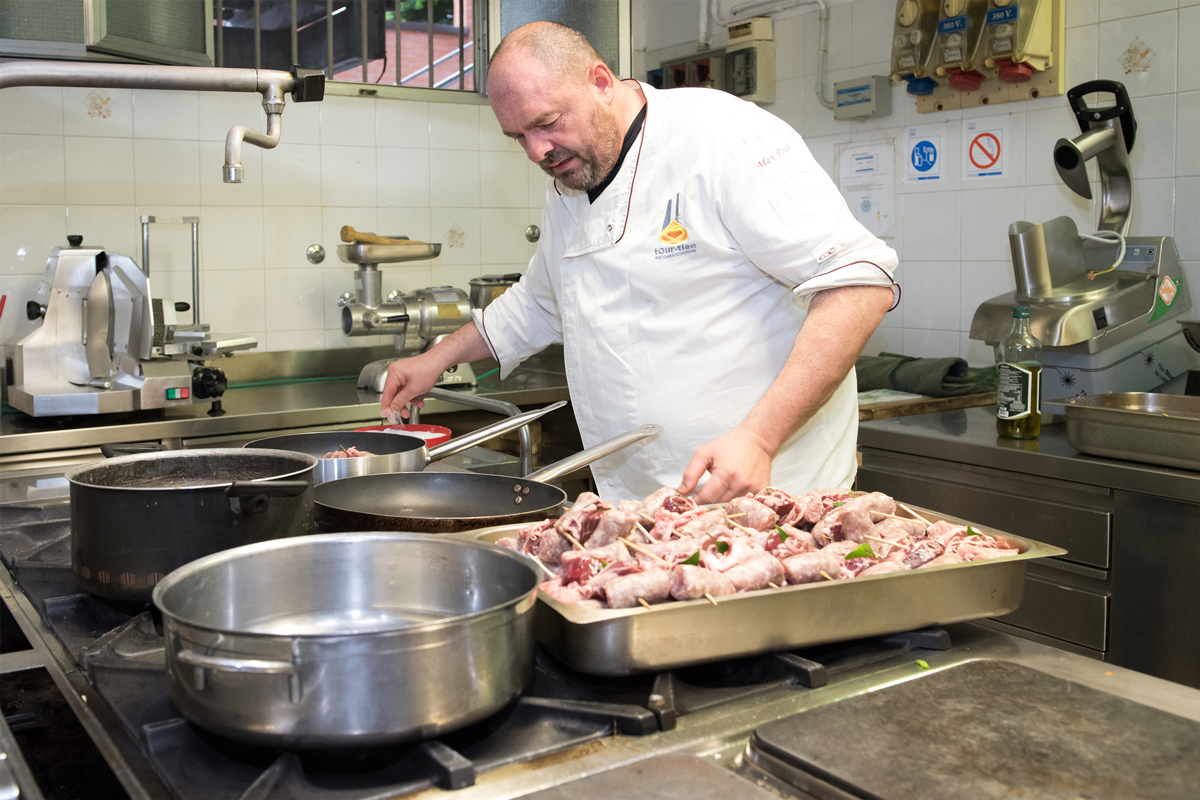
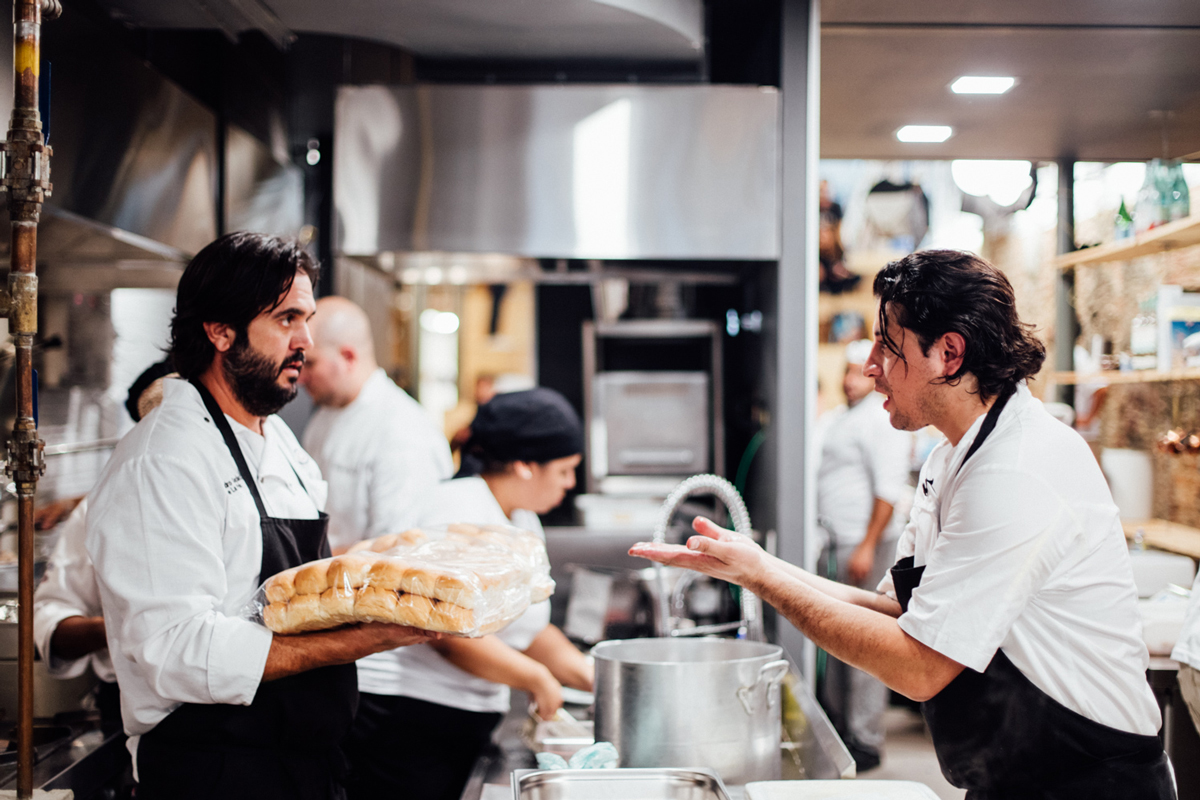
With a plan to serve three meals a day and 70 homeless people per meal, the underprivileged in Rio de Janeiro are (after being confirmed of their poverty) invited to sit down to a five-star meal cooked by Bottura himself and his notable chef friends using leftover ingredients from the Olympic Village’s kitchen (which had to prepare 60,000 meals from 230-tons worth of food per day for athletes, coaches and staff) and other stores in the city.
Conceptually, the name Refettorio Gastromotiva is derived from the word “reficere,” which means ‘to fix or restore,’ and “refectory” that refers to ‘a room used for communal meals in educational or religious institutions.’ Bottura described that he was inspired by the Pope Francis whose contributions to the underprivileged are known to be an important part of his work, and said very clearly that “this is a cultural project, not a charity,” as it is his intent for the homeless to be treated with respect and honor. At most almshouses in Rio de Janeiro, meals are served in trays (pretty much like a prison meal) while utensils are, for convenience and cost reasons, typically disposable. But, it’s an entirely different scenario at Refettorio Gastromotiva. The restaurant’s simple yet intricate decorations are the work of a leading designer with waitpersons meticulously serving the meals and taking care of the patrons. After the Olympics are over, Refettorio Gastromotiva will be adapted into a restaurant that sells lunch for normal customers while the profits will be used to fund the homeless dinner project. The chefs and staff are graduates of Gastromotiva, a non-profit organization founded in 2004 by chef David Hertz who first met Bottura in Milan that works to train members in the slums of Rio de Janeiro into professional chefs.
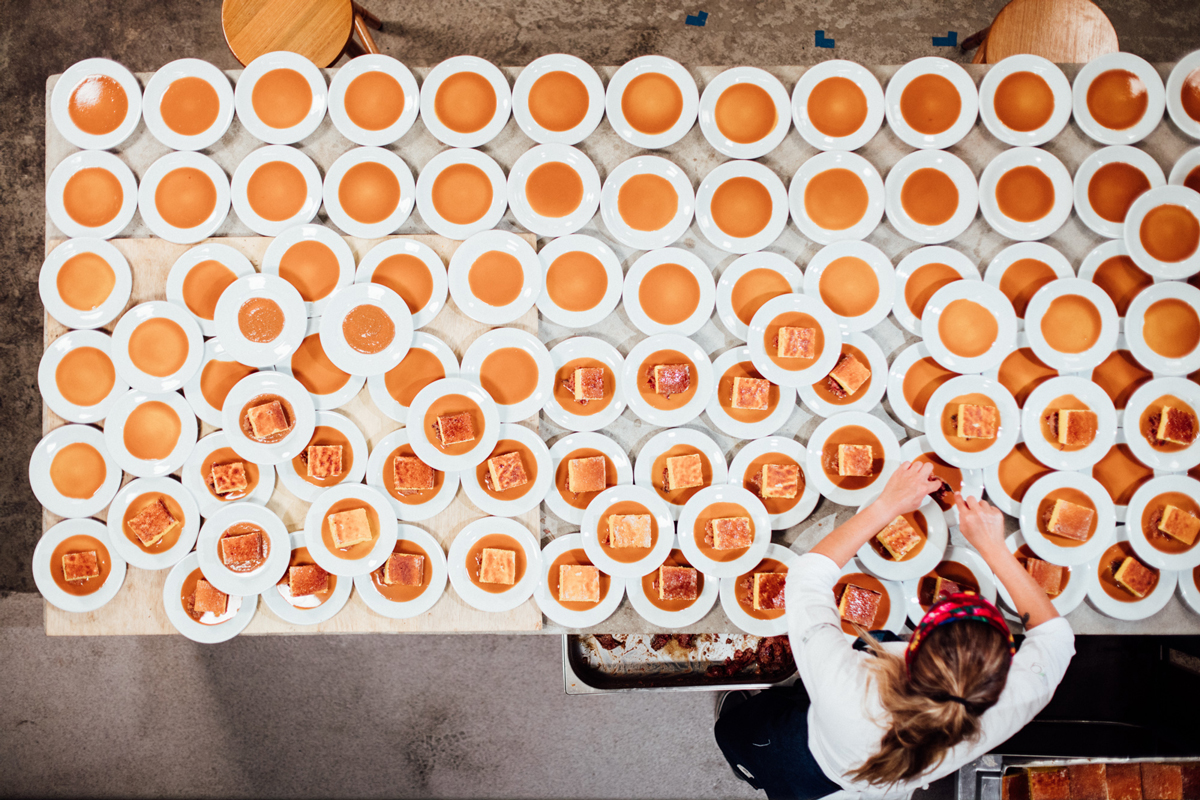
Refettorio Gastromotiva by Bottura and friends is a project that exemplifies an optimized use of people’s artistic abilities and creativity under great limitations where leftovers are turned into a high quality product of high social status. Using their reputations as a tool, the chefs offer a tangible solution and possible development to one of society’s longest standing dilemmas. Back in Bangkok, we heard the news about how the charitable thought to give away free meals at the Sao Ching Cha area turned bad in the form of public littering and urination, fights and mafia involvement, all due to the lack of proper management. Perhaps now is the time for us to seriously discuss the aspect of professionalism and creativity when it comes to charitable acts and social responsibility.
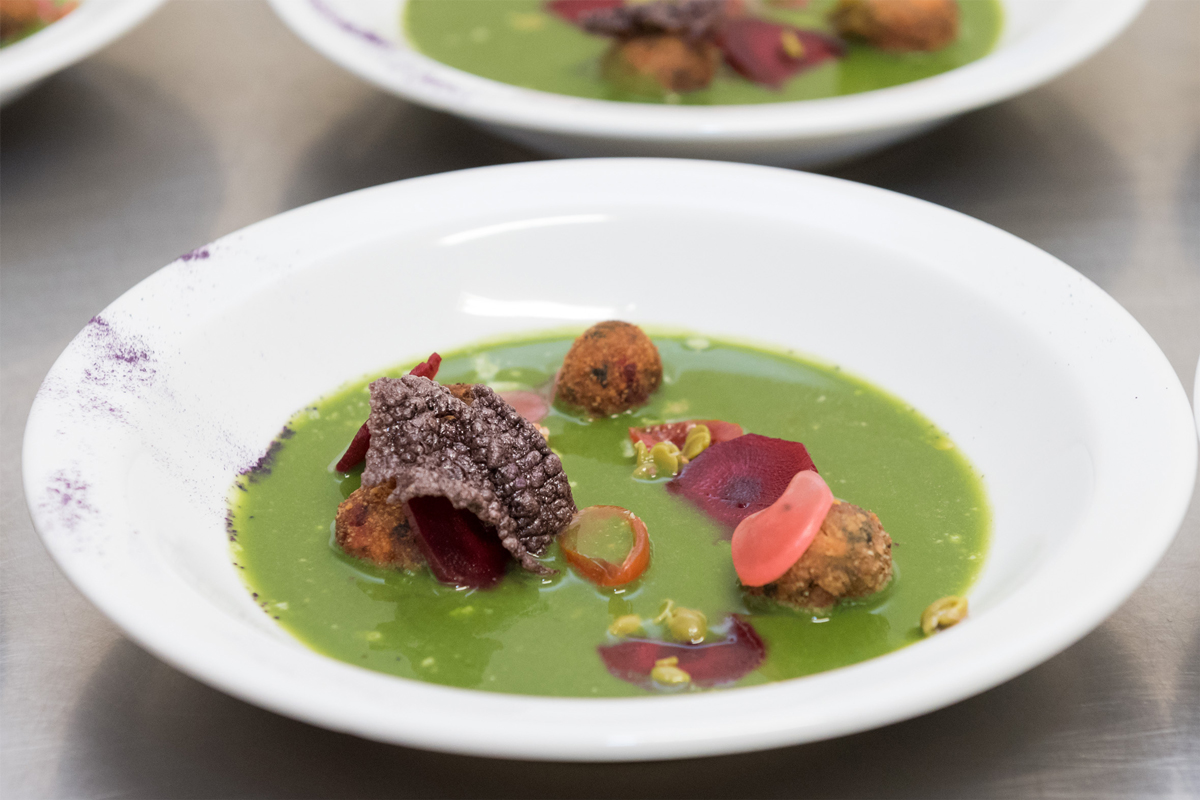
ไอเดียเรื่องการนำ “ของเหลือ” หรือ “ขยะ” มาออกแบบเพื่อใช้ใหม่นั้นไม่ใช่เรื่องใหม่ ที่ผ่านมาเราได้เห็นการยัดเยียดสุนทรียะสไตล์รีไซเคิลรักษ์โลกชิคๆ ให้แก่กลุ่มคนรายได้น้อยมาแล้วก็หลายครั้ง อย่างในงานประกวดแบบต่างๆ ที่ผู้ออกแบบนิยมเอาขยะมาออกแบบใหม่ (แต่ยังตั้งใจให้ดูออกว่าเป็นขยะ) เป็นบ้านหรือเป็นศูนย์ชุมชนให้คนรายได้น้อย บางทีชนชั้นกลางอย่างเราๆ อาจลืมไปว่าคนรายได้น้อยส่วนใหญ่ไม่ได้อยู่อย่างเรียบง่ายและพอเพียงด้วยอุดมการณ์ แต่พวกเขาอยู่อย่างพอเพียงด้วยความจำเป็นต่างหาก ลึกลงไปคนรายได้น้อยก็มีความใฝ่ฝันเหมือนเราหลายคน ที่อยากใช้ชีวิตที่ฟุ่มเฟือย หรูหรา (หรือจะบอกว่าฝันอยากใช้ชีวิตประเภทที่ “ยิ่งใช้โลกก็ยิ่งร้อน” ก็คงจะได้) หากพวกเขาถูกล็อตเตอรี่ หนึ่งในสิ่งแรกที่ทำคงเป็นการเปลี่ยนหลังคาใบจากแสนโรแมนติกเป็นหลังคาสีน้ำเงินสุดแสบตาราคาแพง เพื่อบอกโลกว่าฉันรวยแล้วและขอบอกลาความยากจน ณ ตรงนี้ … เราเชื่อว่าสิ่งที่กล่าวไปข้างต้นนี้ไม่เกินจริง อย่างน้อยก็จนกว่า “ของเหลือ” หรือ “ขยะ” จะ (ถูกทำให้) กลายมาเป็นสิ่งที่ luxury จริงๆ นั่นแหละ เมื่อนั้นเขาเหล่านั้น (และชนชั้นกลางอย่างเราๆ) จึงจะน้อมรับเอา “ของเหลือ” หรือ “ขยะ” ที่ว่านั้นมาอยู่ในชีวิตประจำวันเราได้อย่างภูมิอกภูมิใจจริงๆ
ในกรณีนี้ โครงการ Refettorio Gastromotiva ร้านอาหารแบบ three-course meal สุดหรูเพื่อผู้ยากไร้และคนไร้บ้านที่ Rio de Janeiro ประเทศบราซิล ที่มี Massimo Bottura เชฟดังระดับโลกเป็นเจ้าของ นับเป็นโครงการที่น่าสนใจและน่าพูดถึงเป็นอย่างมาก เพราะเขาไม่ได้พยายามเอาของเหลือมาทำให้ดูเป็นของเหลือ (เพื่อสุนทรียะรักษ์โลกแบบโหลๆ) หรือทำของเหลือใช้ให้เป็นของที่อยู่เพียงในระดับแค่พอใช้เท่านั้น แต่เขาได้ใช้ความคิดสร้างสรรค์และความสามารถแปรเปลี่ยนสภาพของเหลือให้กลายเป็นของหรูหราระดับพิเศษ เป็นสิ่ง luxury ที่ชนชั้นกลางเองก็อยากลิ้มลอง (แต่ไม่สามารถลิ้มลองได้เพราะยากจนไม่พอ) Bottura คือเชฟระดับโลกชาวอิตาเลียน ผู้ครองตำแหน่งมิชลินสามดาวและแชมป์รางวัลสุดยอดร้านอาหารของโลกอันดับหนึ่งใน The World’s 50 Best Restaurants ปี 2016 จากร้าน Osteria Francescana ของเขาที่ตั้งอยู่ที่เมือง Modena ประเทศอิตาลี เขาเกิดในปี 1962 มีความสนใจด้านการทำอาหารตั้งแต่ยังเด็ก โดยได้รับแรงบันดาลใจจากการทำครัวที่บ้านของแม่ ป้า และยายของเขาเอง ในปี 1986 ขณะที่เขากำลังเรียนด้านกฎหมายอยู่นั้น มีร้านอาหารชานเมือง Modena ประกาศขาย เขาพักการเรียนตัวเอง ลงมือซื้อและปรับปรุงร้านดังกล่าวเปิดเป็นร้านอาหารแห่งแรกของตัวเขาเองในชื่อว่า Trattoria del Campazzo จากนั้นในปี 1995 เขาได้เปิดร้าน Osteria Francescana ใจกลางเมือง Modena โดยมีความมุ่งหมายที่จะผสมผสานสูตรอาหารแบบประเพณีเข้ากับนวัตกรรมการออกแบบและศิลปะแบบร่วมสมัย ในปี 2015 ที่มีงาน Expo Milano เกิดขึ้น Bottura และเครือข่ายเพื่อนเชฟระดับโลกของเขาก็ได้ปรับโรงละครเก่าแถบชานเมืองมิลานให้เป็นร้านอาหารสำหรับผู้ลี้ภัย คนไร้บ้าน และคนยากจน โดยเขาได้นำวัตถุดิบที่เหลือจากการทำอาหารกว่า 15 ตัน มาใช้ปรุงเป็นอาหารมากกว่า 10,000 มื้อ
ทีนี้ก็มาถึงการแข่งขันกีฬาโอลิมปิกประจำปี 2016 ที่ Rio de Janeiro ที่ถูกประท้วงต่อต้านจากผู้คนในเมืองมาอย่างต่อเนื่อง เพราะผู้คนมองว่าเงินทุนและงบประมาณมหาศาลที่ต้องใช้ไปกับการเตรียมจัดงานโอลิมปิกนั้นควรเอาไปแก้ปัญหาความยากจนและความเหลื่อมล้ำทางสังคมของประเทศเสียมากกว่า เนื่องจากในช่วงปีที่ผ่านมาเศรษฐกิจของประเทศบราซิลได้ถดถอยถึงขั้นขีดสุด โรงทาน 16 แห่ง ในเมืองถูกยกเลิกหรือตัดงบประมาณดังนั้นโครงการ Refettorio Gastromotiva ของ Bottura จึงเข้ามาช่วยสร้างจิตสำนึกได้อย่างเหมาะเจาะ ทั้งในเรื่องอาหารเหลือใช้ (food waste) และการตั้งคำถามกับความเท่าเทียมทางสังคม โดย Bottura ตั้งใจใช้ความมีชื่อเสียงระดับโลกของเขาเป็นเครื่องมือกระจายเสียงเพื่อตั้งคำถาม ระดมทุน และเป็นกระบอกเสียงอันดังสู่สังคมในวงกว้าง
ในแต่ละวัน วันละ 3 มื้อ คนไร้บ้าน 70 คนต่อ 1 มื้อ ใน Rio de Janeiro จะถูกคัดเลือก (ว่ามีความยากไร้จริง) และได้รับเชิญให้มาร่วมรับประทานอาหารสุดหรูจากฝีมือของ Bottura และเพื่อนๆ โดยวัตถุดิบที่นำมาปรุงนั้นเป็นของเหลือจากการทำอาหารต่างๆ จากหมู่บ้านนักกีฬาโอลิมปิก (ซึ่งต้องการการเตรียมอาหารจำนวน 230 ตันต่อวัน เพื่อเป็นอาหารกว่า 60,000 มื้อ สำหรับนักกีฬา โค้ช และเจ้าหน้าที่) รวมทั้งของเหลือจากร้านรวงอื่นๆ ในเมือง
ชื่อของ Refettorio Gastromotiva มีแนวคิดมาจากคำว่า “reficere” ซึ่งมีความหมายถึงการซ่อมแซม ชุบชีวิต และฟื้นฟู และคำว่า “refectory” ซึ่งหมายถึงโรงรับประทานอาหารในสถานที่ทางศาสนา Bottura ผู้ซึ่งบอกว่าเขาได้แรงบันดาลใจจาก Pope Francis ที่เน้นการให้ความช่วยเหลือแก่ผู้ยากไร้ต่างๆ นั้น กล่าวชัดเจนว่า “This is a cultural project, not a charity” (นี่เป็นโครงการทางวัฒนธรรม ไม่ใช่การกุศล) เขาต้องการให้คนไร้บ้านได้รับการปฏิบัติอย่างมีเกียรติและศักดิ์ศรี โดยทั่วไปอาหารในโรงทานสำหรับคนไร้บ้านใน Rio de Janeiro จะถูกเสิร์ฟในถาดหลุมสไตล์เดียวกับที่เสิร์ฟนักโทษในคุก ถ้วยชามเป็นแบบใช้แล้วทิ้งเพื่อความสะดวกและประหยัด แต่สำหรับที่ Refettorio Gastromotiva ภายในร้านอาหารถูกตกแต่งอย่างเรียบง่ายแต่ประณีต ใช้ดีไซเนอร์ระดับแนวหน้า มีพนักงานเดินเสิร์ฟอย่างวิจิตรบรรจง และเมื่อโอลิมปิกเลิกรา Refettorio Gastromotiva จะถูกแปลงเป็นร้านอาหารที่ขายมื้อกลางวันให้ผู้คนทั่วไป เพื่อนำรายได้ไปสร้างกองทุนมื้ออาหารเย็นให้คนไร้บ้านต่อไป โดยเชฟและพนักงานต่างๆ ในร้านนั้นก็คือผู้ที่จบการศึกษาจาก Gastromotiva องค์กรไม่แสวงหากำไรที่ก่อตั้งในปี 2004 โดยเชฟชื่อ David Hertz ผู้ซึ่งได้พบกับ Bottura ที่มิลานและเป็นองค์กรที่ทำหน้าที่ฝึกสอนผู้คนในชุมชนแออัดของ Rio de Janeiro ให้กลายเป็นเชฟฝีมือดีนั่นเอง
โครงการ Refettorio Gastromotiva ของ Bottura และผองเพื่อนเป็นตัวอย่างที่ดีของการใช้ความสามารถทางศิลปะและความคิดสร้างสรรค์ภายใต้ข้อจำกัดมากมายมาแปรเปลี่ยนของเหลือที่เกือบกลายเป็นขยะให้กลายเป็นสิ่งที่มีคุณภาพสูงและมีสถานะทางสังคม พวกเขาใช้ชื่อเสียง ของตัวเองเป็นเครื่องมือเพื่อเสนอทางเลือกการแก้ปัญหาสังคมที่จับต้องได้และน่าขยายผล ในขณะที่กรุงเทพฯ เองเพิ่งลงข่าวถึงปัญหาของการนำข้าวไปแจกคนไร้บ้านบริเวณเสาชิงช้า ว่าความปรารถนาดีอยากช่วยเหลือเชิงสังคมสงเคราะห์แต่ขาดการบริหารจัดการอย่างเป็นระบบได้นำพาไปสู่ความเดือดร้อนต่างๆ ได้แก่ การทิ้งขยะและขับถ่ายไม่เป็นที่ การทะเลาะวิวาท และการเกิดมาเฟียหัวคิวต่างๆ เป็นต้น… น่าจะถึงเวลาแล้วที่บ้านเราจะพูดถึงความเป็นมืออาชีพและการใช้ความคิดสร้างสรรค์ในการช่วยเหลือสังคมกันอย่างจริงจังเสียที
TEXT : SUPITCHA TOVIVICH
PHOTO : ANGELO DAL BO
refettoriogastromotiva.org

